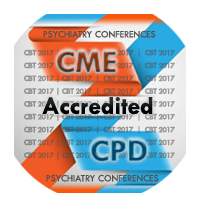Day 1 :
Keynote Forum
Braco Pobric
High Impact Consulting, Training and Coaching Division, USA
Keynote: Create, promote and deliver: How to bring effective positive psychology programs to businesses, schools, non-profit and other organizations?

Biography:
Braco Pobric is the bestselling Author of “Habits and Happiness: How to Become Happier and Improve Your Wellbeing by Changing Your Habits”. He received a Certificate in Positive Psychology from Dr. Tal Ben Shahar-Wholebeing Institute. He was a Presenter at the Fourth World Congress of Positive Psychology, International Conference on Positive Psychology and Cognitive Behavioral Therapy, International Festival of Positive Education and teaches Applied Positive Psychology in corporations, public programs and as a Personal Coach. He has over 18,000 registered online students from 155 countries. Formerly, he was a Certified Trainer and Business Coach for Dale Carnegie Training. He is the Director at ICAP and was previously the Vice President at Merrill Lynch and a Manager at KPMG.
Abstract:
This workshop is designed for aspiring coaches and teachers looking to bring positive psychology programs for corporations, small businesses and schools. In this interactive session, participants will learn how to begin developing their own ideas and proposals for potential clients-and how to present those programs effectively. The session is divided into three major parts and a short research section: In the create section, we will discuss the basics of how to design a clear but comprehensive workshop program. We will discuss what business leaders are looking to bring to their employees, and how you can build a program around their needs. In the promote section, we will go over the basic marketing skills you will need to convince businesses that you are the right person with the right program for their companies. In the deliver section, we will talk about what makes a great teacher of positive psychology, and how you can prepare others to bring positivity into their professional-and personal-lives. Finally, in a brief research section, we will discuss some of the most important resources (books, articles, etc.) that you can turn to as the foundation for your program. You will also learn how to find additional resources to support your specific efforts. By the end of this fun, interactive, and engaging session, participants will have the basic tools necessary to start developing positive psychology workshops that business leaders will be eager to implement in their offices.
Keynote Forum
Mark Andrew Holowchak
University of the Incarnate Word, USA
Keynote: The scientificity of positive psychology: Rising star or empty suit?

Biography:
Mark Andrew Holowchak is a professional Philosopher and Historian of Science. He specializes in psychotherapy, ethics, and the writings of Thomas Jefferson. He has published over 40 books and over 100 peer-reviewed articles on topics such as psychotherapy, ancient philosophy and ethics, philosophy of sport, and critical thinking. He is an Avid Writer and is also the Founder of Phi-Psy Therapy (PPT)—a cognitive-based and principally self-help approach to psychological therapy, chiefly based on ancient Greek and Roman Stoicism, which also draws from other ancient sources (e.g., the writings of Aristotle) as well as contemporary psychological approaches to therapy—especially those with a cognitive base. His current research includes Positive Psychology.
Abstract:
Positive Psychology, a prodigiously influential global movement in psychology, is defined as the scientific study of the strengths that enable individuals and communities to thrive. It is grounded on the notion that “people want to lead meaningful and fulfilling lives, to cultivate what is best within them and to enhance their experiences of love, work, and play. Positive Psychology, turning away from psychopathology and promising to enhance the happiness and wellbeing of non-pathological persons, is said to be a practical application of the “scientific method” to real-life scenarios of everyday people to enhance or give free reign to their “signature strengths.” Adherents, assessed through numerous quizzes designed to assess their measure of happiness, are “taught” techniques for enhancing their wellbeing, and the best tutors are, of course, Positive Psychologists. There is avowedly nothing prescriptive or evaluative is such quizzes and tutorials; they, it is said, aim to be at the level of dispassionate, above-board scientific inquiry. Because it concerns humans’ feelings, traits, and strengths or virtues, Positive Psychology has limitless applications in everyday life. As such, it promises, and the mountains of interdisciplinary literature on it have already shown this, collaborative research with numerous sciences or disciplines, even psychotherapy. Such collaboration is evidence of its abundant fruitfulness and scope-two seemly feathers in its cap. Yet those very successes viz. that it seems to do everything and does everything well should give us pause. Science seldom ever works out so neatly, so cleanly. In short, this “signature strength”—that it promises to help just about everyone in all aspects of life—could be its greatest flaw. To personify the discipline “Is Positive Psychology a rising star—in the words of Martin Seligman, “the road out” of “the parking lot of life”—or an empty suit—in the words of Richard Lazarus, “just another one of the many fads that come and go in our field”? This essay offers an answer to that question.

Biography:
Sandy Joy Weston is the Owner of Weston Fitness in Philadelphia. She recieved her Master’s degree in Exercise Physiology from Temple University, and achieved her Bachelor of Science in Dance from West Chester University. Starting as a premiere personal trainer for stars like the 76ers and Flyers, she has now expanded her business to include 8 corporate fitness sites, and has a growing blog and book. She speaks all over the world, appearing in magazines, newspapers, and on television and radio shows regularly. She lights up a room with her personality and simple system for achieving any goal.
Abstract:
“Train Your Mind, Body Will Follow”, takes complicated subjects about the brain and body and breaks it down. From her experience as NBC10 Philadelphia’s Fitness expert, and coaching members of her gym to athletes, Sandy is able to help a wide-range of audiences tap into the power of their mentality. By fusing her expertise on kinesiology and positive psychology, she has created a system which helps her audience cultivate awareness and personal motivation through power statements. The formula was created in collaboration with Professors from Temple University’s Kinesiology Department, and The University of Pennsylvania’s Positive Psychology Department to address the way the mind and body function both separately and together. The components of the presentation, such as the creating power statements, and tracking personal progress are designed to take between 1-3 minutes per day, making it possible for anyone to adapt to this method of positive thinking. In the same way, physical therapy patients work on moving certain muscles, they are working to train their brain on reconnecting the association to these muscles, as well. We are training our brain to create action plans through affirmations and cultivating positive habits. This system is designed not to over-complicate things, but present these ideas in a manner that appeal to our innate craving for action. Not only is the awareness of the mind-body connection shown to make us happier, but the fact that we can tap into our motivations through this connection and increase our abilities to meet our goals, as well.
- WORKSHOP
Location: HURON NIPISSING
Session Introduction
Meghan Kirwin & Elizabeth K Misener
University of East London, UK
Title: Psychology of Happiness for individual thriving

Biography:
Meghan Kirwin, MBA mission is to empower individuals, teams and organizations to thrive. Meghan is passionate about facilitating positive change with the individuals and organizations she works with. Meghan founded The Kirwin Group Inc. (www.kirwingroup.ca) in 2004 and in her role as mentor, coach and facilitator has focused on building thriving workplaces. Meghan developed the Vitality at Work brand (www.vitalityatwork.ca) with a single focus of supporting individuals and organizations to realize their full potential through the application of positive psychology. Meghan has completed a Master’s in Business Administration from Wilfrid Laurier specializing in Leadership and Organizational Behaviour. She also completed a Certificate in Applied Positive Psychology (CAPP) from the Wholebeing Institute, where she studied under Dr. Tal Ben Shahar from Harvard University. Meghan is currently working on the completion of a Masters in Science in Applied Positive Psychology from University of East London, England, which is one of the leading Universities in the field of positive psychology.
Elizabeth K. Misener, PhD, LMSW, is an Assistant Professor in the Masters of Social Work Program at the University of Southern California in their Virtual Academic Centre & Co-founder of Vitality At Work. Her mission at Vitality At Work is to empower individuals, teams and organizations to achieve their full potential through a focused approach grounded in positive psychology (also called the "science of happiness"). Among Elizabeth’s areas of specialization are supporting people to reduce stress, encourage personal growth, enhance parenting skills, facilitate decision making, manage time, bolster motivation, clarify objectives, and develop concrete, attainable goals. She has been trained in the technique of Problem Solving Therapy and earned a Meditation and Mindfulness Teacher Training Certificate, both of which are evidence based intervention for people struggling with depression.
Abstract:
Statement of Problem: Women are balancing many roles in their life which can lead to high levels of stress and burnout. Many of these women will not seek mental health support in the form of traditional mental health care. There is a need to explore an effective empowering intervention for this population.
Methodology & Theoretical Orientation: Exploratory research was conducted to observe how resilience and wellbeing can be cultivated through the application of positive psychology interventions. The structure included an interactive learning environment of a small group of six women that meet once a week for eight weeks, with each session lasting 1.15 hours. There were two facilitators guiding the learning and self-exploration process. The facilitators provided the theoretical foundation needed for learners to understand, appreciate and apply three core principals from the field of Positive Psychology; positive emotions, mindfulness and character strengths. With applied models of practice and experiential activities, the group was guided through a process the used narrative practices to explore the impact of the positive psychology intervention on their life. The process demonstrated the importance of positive emotions, mindfulness and character strengths as habits that can be cultivated to support learners cultivate resilience and improve wellbeing.
Findings: The 8-week group model taught the learners the knowledge and applications of scientifically based positive psychology interventions to build resilience and improve wellbeing.
Conclusion & Significance. The model of an 8-week group experience focused on providing the theoretical foundation and application of positive psychology interventions through experiential activities and narrative practices can be a powerful therapeutic model to cultivate resilience and improve wellbeing for women managing many roles in their life.
Roopak Desai
Union Bank of Switzerland, USA
Title: Running - An ultimate source to Health, Happiness and Wellbeing
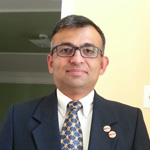
Biography:
Roopak Desai participated in the first signature Habits and Happiness Programing 2012 conducted by The Institute of Advance Human Performance (IFHAP). He has been a practitioner of meditation, mindfulness and gratitude journaling since then. He now serves as a member coach at Positive Psychology - The Science of Happiness led by Braco Pobric and a passionate runner. His alter ego is Marathon for Life runner after running helped fighting and negotiating anxiety and depression. The Marathon for Life runner is a strong advocate to take up running as a lifestyle and will be sharing why it is the ultimate source to happiness, health and wellbeing. Applied Positive Psychology principals combined with the euphoric neural conditions that running creates, enabled him to re-train his own brain and alter its neural pathways, allowing him to finally overcome 20 odd years of clinical depression. His sole purpose is to make a difference in world by helping people with their health, happiness and wellbeing by spreading awareness and knowledge.
Abstract:
I have self-discovered through my journey of running so far that running is indeed an ultimate source to health, happiness and wellbeing. My journey started four years ago. And before that I have been suffering from chronic anxiety and depression. I went through a severe attack of anxiety in 2012 and, I went spiralling down with cyclic negative depressive thought without any hope to come out of it and truly live the life with purpose. But with inner calling, I took up running. I prepared and ran my first 5k, 10k and by end of 2013, I ran my first half marathon. I started feeling good, got moral boost, felt self-worth and got a can-do feeling and continued running to my first full marathon in 2015. In the process, I overcame anxiety and depression and able to cope with its episodes without caving in it. This motivated me to go ahead and study effect of running on "Science of Happiness", "Positive Psychology" and "Mental Well-Being". I found out about how different neurotransmitters like endorphins and dopamine released by chemical responses on stimulation of brain helps to boost your confidence and gives euphoric effect (Runner's High). And I also learnt running as "large clinical impact" on depression. Based on my studies, I learnt that with applied positive psychology and the euphoric neural conditions that running creates enables to retrain your own brain to start taking things positively and alter its neural pathways to help deal with anxiety and depression by feeling motivated, energetic and confident. My mission, The Marathon for Life, which is alter ego now is to affirm the research and studies conducted on running and its impact on health, happiness and wellbeing. I intend to take the message mainstream and have collective inputs from all the runners with similar stories to potentially raise awareness for positively impacting lives to overcome anxiety/depression and for communication.
- Positive Psychology Interventions | Happiness | Psychotherapy | ADHD
Location: HURON NIPISSING
Session Introduction
Roopak Desai
Union Bank of Switzerland, USA
Title: Running - An ultimate source to Health, Happiness and Well being
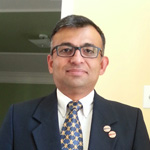
Biography:
Roopak Desai participated in the first signature Habits and Happiness Programing 2012 conducted by The Institute of Advance Human Performance (IFHAP). He has been a practitioner of meditation, mindfulness and gratitude journaling since then. He now serves as a member coach at Positive Psychology - The Science of Happiness led by Braco Pobric and a passionate runner. His alter ego is Marathon for Life runner after running helped fighting and negotiating anxiety and depression. The Marathon for Life runner is a strong advocate to take up running as a lifestyle and will be sharing why it is the ultimate source to happiness, health and wellbeing. Applied Positive Psychology principals combined with the euphoric neural conditions that running creates, enabled him to re-train his own brain and alter its neural pathways, allowing him to finally overcome 20 odd years of clinical depression. His sole purpose is to make a difference in world by helping people with their health, happiness and wellbeing by spreading awareness and knowledge.
Abstract:
I have self-discovered through my journey of running so far that running is indeed an ultimate source to health, happiness and wellbeing. My journey started four years ago. And before that I have been suffering from chronic anxiety and depression. I went through a severe attack of anxiety in 2012 and, I went spiralling down with cyclic negative depressive thought without any hope to come out of it and truly live the life with purpose. But with inner calling, I took up running. I prepared and ran my first 5k, 10k and by end of 2013, I ran my first half marathon. I started feeling good, got moral boost, felt self-worth and got a can-do feeling and continued running to my first full marathon in 2015. In the process, I overcame anxiety and depression and able to cope with its episodes without caving in it. This motivated me to go ahead and study effect of running on "Science of Happiness", "Positive Psychology" and "Mental Well-Being". I found out about how different neurotransmitters like endorphins and dopamine released by chemical responses on stimulation of brain helps to boost your confidence and gives euphoric effect (Runner's High). And I also learnt running as "large clinical impact" on depression. Based on my studies, I learnt that with applied positive psychology and the euphoric neural conditions that running creates enables to retrain your own brain to start taking things positively and alter its neural pathways to help deal with anxiety and depression by feeling motivated, energetic and confident. My mission, The Marathon for Life, which is alter ego now is to affirm the research and studies conducted on running and its impact on health, happiness and wellbeing. I intend to take the message mainstream and have collective inputs from all the runners with similar stories to potentially raise awareness for positively impacting lives to overcome anxiety/depression and for communities as whole.
Jamie Rose Brown
Kyani-Team Fusion & the Happiness Ninja, Australia
Title: Creating a better world through online avenues in positive psychology

Biography:
Jamie Rose Brown has completed the worlds’ only government accredited Diploma of Positive Psychology and Wellbeing, recognizing her as a Positive Psychology Practitioner. She is passionate about making a difference in this world. Applied Positive Psychology principals enabled her to re-train her own brain and alter its neural pathways, allowing her to finally overcome 17 years of clinical depression in 2014. She is currently in the process of establishing her own positive psychology programs and is passionate about sharing her story with the world and inspiring others to find their true potential.
Abstract:
Do positive psychology interventions provide an effective treatment for mental health problems? There is growing evidence to suggest that it does. The research conducted specifically on the benefits of online positive psychology programs is minimal but promising. Results suggest that using an online positive psychology program can decrease symptoms of psychopathology and increase well-being in young people, especially for those who use the website for 30 minutes or longer per week or more frequently. Qualitative data indicated that 49 of 61 users (79%) reported positive experiences using the website and 55 (89%) agreed they would continue to use it after study completion. Compared to the control condition, participants in the condition with high levels of adherence (usage of the website for 30 minutes or more per week) reported significant decreases in depression and stress and improvements in well-being. These findings are encouraging and suggest that the online delivery of positive psychology programs may be an alternate way to address mental health issues and improve youth well-being nationally. The gaps in this overall area is detrimental to the welfare of both our current and future generations and the methods in which maximum reach of preventative programs through technology advancements can be conducted. The project – The Happiness Nina – helps to fill this gap. In my project I will be looking at the impact that online programs and community forums have on people’s [not just youth] overall mental health and well-being levels. I argue that online programs are a suitable platform to create mainstream growth, connectedness and awareness, which will create a valuable impact on both individuals and communities as a whole. This project will shed new light on these overlooked areas and help path the way for the future
Vijay Warad
Grant Medical College, India
Title: A clinical trial to evaluate the comparative efficacy of cognium syrup with standard behavioral therapy vis-a-vis standard behavioral therapy alone in children with Attention- Deficit Hyperactivity Disorder (ADHD)
Time : 12:20-12:40
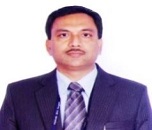
Biography:
Vijay Warad has completed his MD from Grant Medical College, J J Group of Hospitals in Mumbai, India. He is a practicing Pediatrician in Pediatric Psychology and Behavioral Expert and Adolescent Expert in AACCI (Indian Association of Child and Adolescent Care). He is a National Faculty and has authored many books and modules of Indian Academy of Pediatrics. He is also a Member of World Allergy Organization, IAP’s adolescent chapter; President of Universal Health Foundation for socially deprived children. He is involved in numerous clinical researches in pediatrics and has several publications to his credit.
Abstract:
ADHD is a common neurobehavioral disorder affecting children across different settings with significant limitations in functioning. According to the CDC, the recommended treatment for ADHD is a combination of medication and behavioral therapy. However, pharmacological entities available have potential adverse effects. Therefore, herbal formulations with extensively researched ingredients such as Bacopa monnieri and Centella asiatica with proven efficacy, tolerability and safety profile are gaining more popularity over conventional drugs in treatment of ADHD.
Methodology & Theoretical Orientation: This randomized, comparative, 16-week study was conducted to compare the efficacy of cognium syrup and standard behavioral therapy vis-a-vis standard behavioral therapy alone, in school children of 6-14 years of age with ADHD. A total of 76 children were enrolled as per the DSM- IV criteria for ADHD. Enrolled patients were divided into two groups. Children in Group-A were given cognium syrup along with standard behavioral therapy and those in Group-B received standard behavioral therapy only. Efficacy was measured by improvement in total symptom score, average performance score and by physician’s global assessment.
Findings: Treatment with cognium syrup led to uniform improvement in all parameters. The total symptom score significantly decreased in 96.6% patients in Group-A compared to 46.6% in Group-B. The average performance score for functional impairment significantly improved in 80% patients in Group-A and 36.66% patients in Group-B. Cognium syrup was well tolerated with good patient compliance.
Conclusion & Significance: Cognium syrup demonstrated significant improvement in ADHD core symptoms-inattention, hyperactivity and impulsiveness. This study therefore confirms that cognium syrup along with standard behavioral therapy proved more efficacious than behavioral therapy alone in the management of ADHD in children. Herbal formulations can offer a valuable alternative to current drug therapy for the management of ADHD.
Yaqui Andres Martinez Robles
CÃrculo de Estudios en Psicoterapia Existencial, Mexico
Title: The four languages of experience: Existential therapy, proposal from the Mexican school

Biography:
Yaqui Andrés Martínez Robles is an Existential-phenomenological and Hermeneutical Analyst and Therapist and a Gestalt Therapist. He is the Secretary of the Latin-American Association of Existential Psychotherapy. He is the Founder and Chair of the Círculo de Estudios en Terapia Existencial, in Mexico. He is the Representative of the Mexican School of Existential Therapy and Analysis and also a Member of the Editorial Board of Existential Analysis (Journal of the Society for Existential Analysis, London). He has authored and co-authored several books and articles on Existential Therapy.
Abstract:
Currently, existential therapy has many variations, the Mexican School is but one of them and its proposals emerge from a mestizo position in the world of psychotherapy. The Latin American culture, and especially that of Mexico, is characterized by an intense history of miscegenation, combining not only races and cultures, but also customs, beliefs and, in fact, all of a world vision. This scenario has paved the road for the Mexican School of Existential Therapy to develop, at a psychotherapeutic level, its own proposal that arose upon the integration of elements from Europe (English, German and French), as well as North and South America, to our own experience and history. This approach to Existential Therapy is interested in exploring and analyzing experience, always understanding it as a part of the experience-behavior continuum, and taking into account the four possible languages in which experience is organized, integrated and expressed. These four languages are: a) The Physical-Sensory, b) The Interpersonal-Emotional, c) The Personal-Rational, and d) The Symbolic-Spiritual. The therapeutic exploration begins with the language the client uses to narrate his experience, progressively widening, through dialogue, the narrative expressiveness and, with it, the perspective and understanding of his experience.
- WORKSHOP-2
Location: HURON NIPISSING
Session Introduction
Michael T Walker
Associated Counselors & Therapists, USA
Title: The social construction of mental illness and its implications for neuroplasticity
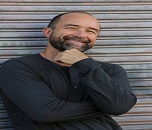
Biography:
Michael T Walker has been exploring client-centered, collaborative and constructivist methods for 25 years while working in community mental health in South Central Los Angeles as well as in private practice. His commitment to results in Psychotherapy has led him to a powerful historical, philosophical (postmodern) and linguistic critique of the clinical worldview.
Abstract:
The social construction of mental illness and its implications for neuroplasticity examine how the current concept of mental illness in society informs the dialogic skills and perspectives of psychotherapists. The common interpretation of unconventional behavior as a symptom of illness has marginalized the creative class and deterred mental health professionals from developing the skills and perspectives needed to empower their clients. Too often the neuroplasticity of the human brain is ignored in favor of the organizing metaphor of chemical imbalance which often results in the relegation of clients’ needs to the pharmaceutical industry. Michael T. Walker encourages psychotherapists to evolve their practice by considering the new information available in neuroscience, psychotherapy outcome studies, and postmodern psychotherapies.
- Yoga & Meditation | Mindfulness | Depression | Cognitive Behavioral Therapy
Location: HURON NIPISSING
Session Introduction
Andrew Safer
Safer Mindfulness, Canada
Title: Navigating anxiety and stress through mindfulness: Cultivating mindfulness and awareness in a community-based setting

Biography:
Andrew Safer is a Mindfulness Instructor and Trainer, Program Developer, Workshop Facilitator, and Writer. As a 48-year practitioner of mindfulness-awareness and Zen meditation, he began practicing in the Zen tradition in 1968, while in high school, and then continued in the Tibetan Buddhist and Shambhala traditions over the ensuing decades. He became an authorized Meditation Instructor after completing training with Shambhala International in Halifax in 1993. He moved to St. John's in 2008 and began offering mindfulness workshops through the Family Life Bureau in 2010. He has delivered Mindfulness workshops and training for a wide range of organizations including Addiction Treatment Services Association, Canadian Breast Cancer Foundation-NL, Canadian Mental Health Association-NL, Desjardins Financial Security Life Assurance Company, Eastern Health, Key Assets, Memorial University, Newfoundland and Labrador Federation of School Councils, Newfoundland and Labrador Housing, and Newfoundland and Labrador Sexual Assault Crisis and Prevention Centre. Since 2010, he has developed and implemented a number of secular mindfulness programs, including Mindfulness-Awareness (an 8-session weekly program), Mindfulness in Recovery (a 6-session weekly program plus one full day), Dealing with Anxiety and Stress Through Mindfulness (a 7-session weekly program plus one-half day), Mindfulness at School (10 one-hour sessions), and Workplace Mindfulness (10 1-hour sessions). He is a member of the Faculty of the Atlantic Contemplative Centre in Halifax.
Abstract:
Statement of the Problem: Stress afflicts 23% of Canadians age 15 and over and 30% of adults between 35 and 54, significantly impacting health and well-being, absenteeism, and health care costs. Anxiety disorders, ranging from mild to severe impairment, impact 12% of Canadians. Community-based non-medical alternatives are needed to relieve pressure from the health care system, provide wellness-based solutions that do not rely on medication, and empower the individual to assume a primary role in self-care. The purpose of the 8-week “Navigating Anxiety and Stress through Mindfulness” program is to assist individuals who identify problematic anxiety and/or stress by contextualizing and presenting mindfulness-awareness meditation training and related practices.
Methodology & Theoretical Orientation: Mindfulness training develops precision and accuracy; awareness training fosters openness and a greater connection to the environment. Rather than regarding anxiety and stress as problems to be gotten rid of, participants were coached to relate to these experiences non-judgmentally, with openness, curiosity, and an interest in learning from them. The eight 2.5-hour sessions incorporated mindfulness-awareness meditation, walking meditation, “head and shoulders” (pausing practice), tonglen (compassion practice), and mindfulness-in-everyday-life activities.
Findings: Data from five groups (40 participants) indicated a 40% improvement in scores. Participants’ self-reports indicated significant improvement in: their ability to interrupt storylines (discursive thought patterns), rumination, not being fully present, and their ability to accept things as they are, ranging from 25% to 60%.
Conclusion & Significance: It is evident that participants found mindfulness-awareness meditation and related practices beneficial. Their evaluation responses showed significant understanding of the key elements of mindfulness and that they had begun integrating mindfulness into their lives. The majority developed a regular home meditation practice. The program proved to be viable in a community-based setting.
Wayne P Gillis
Saint Mary's University, Canada
Title: Always-adapt.com to life change, never react to it

Biography:
Wayne P Gillis was a national Bank Trainer then went onto build a successful business in Ocala Florida. After the sale, he returned to Canada to go to University, with plans to become a Medical Doctor. However the course, “The Psychology of Law” altered his path. Then in 2005, a car struck the motorcycle he was driving and atop his numerous injuries, was a closed head traumatic brain injury (TBI). It was that trauma that started his life all over again. From simple walking to talking, he has lived in Charlottetown PEI, Halifax Nova Scotia and most recently Celebration & Kissimmee Florida. He has developed his Keynote Speech and coaching business while being a stay at home dad, actively managing his two active sons in swimming and competitive gymnastics. He has spoken to Dalhousie University School of Physiotherapy, Sun Life Financial as well as CIBC. His passion is to pass his simple yet effective recovery choice to other survivors and all people in general, dealing with life’s inevitable change.
Abstract:
Millions of head trauma cases occur every year in the United States alone and contribute to thousands of deaths. Age is the largest swaying factor. Traumatic Brain Injury or TBI significantly contributes to this death of many people. The leading cause varies by age. In 2012, a little fewer than 330,000 people aged 19 or younger were treated in US emergency rooms (ER’s) for sports and recreation related injuries. ‘Head trauma’ includes the diagnosis and treatment of a concussion or TBI. Accidental falls was the leading cause in older individuals with unintentional self-harm the 2nd leading reason. Overall, motor vehicle crashes caused a significant number of TBI-related ER visits, hospitalizations and deaths. Head Trauma represents a staggering percentage of personal injury and disability causes in today’s society. Directly in this study of recovery, his recommendations to timing, availability of therapy, to one’s cognitive level or dissonance, all play an active part in the retrieval of one’s inner self. During this journey of rebuilding & learning, one thing became crystal clear to him. Setting and attaining a realistic goal, feeling proud then adapting to another. “Moving Forward” no less.

Biography:
Zokaitluangi is a Professor in Psychology at Mizoram University (India) for more than 28 years. She developed Positive Psychology paper and has been teaching the paper for more than 7 years at the same university. She has published more than 25 research articles in reputed journals. She has completed two major research projects of University Grant Commission (New Delhi) and Indian Council of Social Sciences Research (New Delhi), and two major researches are going of Indian council of Social Sciences Research (New Delhi) and National Commission for Women (New Delhi). She has been supervising PhD and MPhil Researches, and 17 Scholars were awarded PhD degree under her supervision. She has been honored in different academic and government bodies - Expert Member to Indian Council of Social Sciences Research (New Delhi), Expert Member of University Grant Commission for Eastern Region (ERO, Kolkatta), Expert Member for selection of Teacher in Magadh University (Gaya Bihar), Nagaland University (Nagaland), Jai Prakash University (Chabra), Lalit Narayan Mithila University (Darbanga), Patna University (Patna), Gauhati University (Guwahati), Member of Mizoram State Commission for Women, expert of Arunachal Pradesh Public commission and expert of Mizoram Public Service Commission.
Abstract:
The aim was to study the general health, depression, resilience and burden of the caregivers of patients with mental disorders and cancer patients. The sample incorporates 100 main caregivers of patients with mental disorders and 100 main caregivers of cancer patients who are residents of Mizoram. They were partitioned on the basis of duration of care giving as the main caregiver and have been giving care to the patient (either with mental disorder or cancer) for more than 6 months in their respective places or at the hospitals, within the age range of 18 years and above were selected following random sampling procedures from targeted population. The psychological test such as - the socio- demographic data sheet, followed by the General Health Questionnaire-28, The Beck Depression Inventory- II, The Resilience Scale, and finally The Zarit Burden Interview were employed for psychological evaluation. The psychometric properties of the tests were checked with an objective to justify the appropriate statistical treatment for further analyses. The results highlighted that being a main caregiver has significant impact on different facets of the caregiver’s life and that in many situations the impact also tended to be mostly negative. Many are on the brink of having a major mental illness, while some even exhibited clear cut signs of a serious mental illness. The results suggest the needs of psychological diagnosis and interventions for the main caregiver of patient with mental disorder.
Jigar Parikh
Shri P. H. G. Municipal Arts & Science College, India
Title: Yoga and meditation as effective tools for mental and physical wellness

Biography:
Jigar Parikh did his Doctorate in Psychology. He has been an enterprising and purposeful Associate Professor of Psychology, since 23 years. He currently serves at Shri P H G Municipal Arts & Science College, Kalol, affiliated to Gujarat University. He runs suicide prevention project with Indian Police and Government, since last 2 years. He delivers counselling services across the academic year to promote healthy psychological well-being of youth. Furthermore, he serves Guide ship in more than four universities and seven of his students are waiting to be awarded for the Doctorate degree. He aims at spreading knowledge with gist of his experiences to youth especially and society at large. For the same, he has been conducting seminars for audiences of all age groups on the themes interwoven to Psychology. Adding to his achievements, he has published seven research papers in national and international journals. He has successfully completed a minor research project on Child Labor under UGC.
Abstract:
Yoga is a globally known phenomenon to maintain synchronicity between body and mind. Its practice is a journey in itself starting from body moving to mental capacities and self actualization. As per Maslow’s hierarchy of needs also, the journey of human needs and the evolution of mankind raises from mere biological needs to the need of self actualization. This brings the clarity that the natural form of our psyche is positive and progressive. Due to life challenges and complexities of experiences across the life span, human being unknowingly scatters himself from the roots of his existence. The term ‘Yoga’ is derived from Sanskrit language and it means ‘union’. Here union is with reference to physical, mental and spiritual practices. Yoga delineates 196 sutras which are elaborated by Patanjali. Yoga is transferred through a guru (master) - Shishya (disciple) relationship. Spirituality is enunciated in well-known Indian scriptures like, Vedas, Bhagvad Gita, Upanishads and many more. Through regular practice of Yoga one can attain a disease free and fully functioning body and through regular practice of meditation one can attain a disturbance free mental wellness with lots of mental capacities making a person’s performance extra ordinary from ordinary. Considering the mental illnesses, Yoga and meditation proves to be highly effective therapeutic techniques of healing and treating symptoms of psychological disorders. Through breathing discipline the hormones responsible of mood swings and negativity are balanced resulting into a healthy state of mind. Man’s conscious efforts to throw out maximum carbon dioxide possible results into better capacity to solve problem and attain peace.
Nigar Sekercioglu
Mc Master University, Canada
Title: Depression in patients with chronic kidney disease

Biography:
Nigar Sekercioglu is a Nephrologist. She has completed her Master's degree in Clinical Epidemiology from the Memorial University. She obtained her PhD degree in Health Research Methods, Evidence and Impact from McMaster University.
Abstract:
Recurrent depressive disorder or major depressive disorder (henceforth referred to as depression) is a clinical syndrome that persists at least two weeks. Patients with depression may have suicidal thoughts, depressed mood as well as diminished appetite, sleep and no interest in usual activities. The prevalence of depression ranges from 2 to 9% in the general population. The presence of comorbid conditions, high body-mass index and lower socio-economic status, all have been associated with depression. Chronic kidney disease (CKD) is described as irreversible loss of kidney functions. The prevalence of depression has been shown to be high in CKD patients and has been linked to mortality. Depression management include pharmacotherapy, psychotherapy and electroconvulsive therapy. Neurochemical imbalance in the central nervous system is the root of the problem in depression. The disease process involves several alterations in the brain and in the peripheral nervous system, including reduced serotonin and increased sympathetic tone. The sympathetic nervous system is governed by the hypothalamic-pituitary-adrenal (HPA) axis. Corticotrophin Releasing Hormone (CRH) is one of the substances that is released by the HPA axis and stimulates the secretion of adrenocorticotropic hormone (ACTH) which stimulates the adrenal cortex and medulla, and increases epinephrine and norepinephrine levels. Previous research showed that the volume of space occupied by CRH neurons increased in depression. The HPA is inhibited by Gamma Amino Butyric acid (GABA) and cortisol feedback. Overall, the underlying pathophysiology of depression is complex, and involves several substances. Due to lack of negative feedback of GABA and/or alpha 2 adrenergic systems, the HPA becomes overactive with elevated CRH levels. CRH stimulates corticotrophs and ACTH is secreted. As a result, a sympathovagal imbalance is established, contributing to the disease process.
- YOUNG RESEARCH FORUM
Location: HURON NIPISSING
Session Introduction
Deniz Oruc
Uskudar University, Turkey
Title: The effect of attachment styles on marriage compatibility in Turkish couples

Biography:
Deniz Oruc is a staff Pyschologist in Public Health division in Istanbul. She has been working in different departments of the Ministry of Health, since 2009. She obtained a Bachelor’s degree in Pyschology from Uludag University, Bursa. She is currently studying towards a Master’s degree in Clinical Psychology at Uskudar University, Istanbul. Her research interests include attachment styles in marriage. She has conducted comprehensive research by interviewing many clients to enhance her knowledge and understanding on this subject. As the next step, she plans to examine the effect of attachment in marriage preferences.
Abstract:
Purpose of the Research: This study provides a comprehensive review of several studies that examined the effect of attachment styles on marriage compatibility in Turkish couples between 2000 and 2016.
Introduction: Marriage is an important life event which impacts a person’s life and behaviour. Compatibility in marriage, according to one definition, is considered concept of balance which means to keep balance of voluntary and required dimensions of the relationship. Marriage and marriage compatibility affects both the couples and and the social network around them.
Methods: A systematic review of relevant articles published in peer reviewd journals between 2000 and 2016 was taken.
Results: A person’s attachment style with his/her mother during childhood has a significant effect on marriage compatibility. Furthermore, an individual’s attachment style determines that person’s relationship with others throughtout his/her life. There are different attachments styles from mother to the child as well as from one adult to another adult. From a child to his/her mother three attachments styles are most common: secure, anxious resistant, and anxious aviodant. From one adult to the other there are four attachment styles: Secure, fearful, dismissive, and preoccupied. According to Ertan (2002), the most common attachment styles in marriages, in insecure attachment is in Turkey. The married couples with highest level of compatibility experience the secure attachment style. Another study concluded that individuals with secure-preoccupied attachment styles have higher marriage compatibility compared to the ones with dismissive-fearful attachment styles. In Turkish culture, being jealous towards the partner or maintaining a very close tie with the partner are considered asset qualities in relationships, therefore individuals with preoccupied attachments style are assessed with higher compatibility rates.
Sahar El Shourbagi
Sultan Qaboos University, Oman
Title: Parental involvement in inclusive classrooms for students with learning disabilities at Omani schools as perceived by teachers
Time : 16:35-16:55

Biography:
Sahar El Shourbagi has finished her Phd in Psycho-pedagogy from University of Montreal. Currently she is working as an Assistant Professor in Faculty of Education, Sultan Qaboos University and Department of Psychology in Oman. She was expertise in the mainstream classrooms and passion in improving the education of pupils with disabilities. She conducted many researches about teaching and educating students with disabilities, using the multimedia in teaching them and awareness of parental involvement
Abstract:
Statement of the Problem: Recent statistics shows that the proportion of students with disabilities who spend 80% or more of the school day in general education classrooms has substantially increased from 34% in 1990 to 61% in 2011. In Sultanate of Oman this number was increased too. Despite these optimistic statistics, the process of inclusion has been faced by many challenges: A limited number of certified special education personnel; lack of proper training for teachers in mainstream classrooms and the lack of parental support in children’s school. In the Omani context, research about the parental involvement in the mainstream classrooms was rarely conducted.
Aim: The purpose of the study is to investigate the parental involvement in educating their children with disabilities in inclusive classrooms at Omani schools as perceived by teachers.
Methodology & Theoretical Orientation: Researcher employs the use of a survey questionnaire to investigate the parent involvement. Quantitative statistical methods are used to analyze the findings of the data collected on the Likert-scale used in the survey questionnaire. The instrument used in the study was adopted from a study recently conducted in Oman by Al Mashaykhi (2015).
Findings: Participants’ have high perception of the importance of parental involvement in the inclusive classroom but low perception of the practices they use to be involved in these classes. Besides that, findings of Pearson correlation coefficient analysis, among importance and practices of parental involvement showed that these variables correlated negatively.
Conclusion & Significance: Descriptive analyses showed that teachers perceive the parental involvement in the inclusive classroom is important to support the education for the children with disabilities, but the study showed also that less action were taken from the parent to activate this involvement. The researcher recommends adding qualitative methods to discuss more related issues with teachers, parents and other stakeholders.
Sree Mattananda Sraman
The University of Hong Kong, Hong Kong
Title: Buddhism and innovative sustainable development
Biography:
Sree Mattananda Sraman is a Bangladeshi Buddhist Monk who was ordained as a monk at the age of 12. He has done his Ordinary and Advanced level studies in Compassion Buddhist Institute, Colombo, Sri Lanka, Bachelor of Buddhist Studies at Mahachulalongkornrajavidyalaya University Bangkok, Thailand, and Master of Business Administration at Siam University, Bangkok, Thailand. He is currently studying Master of Buddhist Studies at the University of Hong Kong. He loves to attend conferences, seminars and research meetings to learn more and share whatever he knows.
Abstract:
This present article is an analytical research on Buddhism and Innovative Sustainable Developments. The main purpose is to study the mental health problems including posttraumatic stress disorder (PTSD) and alcohol dependency. Researchers have reported that women with these experiences are more difficult to treat. The aim of studying is also to comprehend every human to be aware that people’s happiness and sorrow depends on the choices that they had taken to do what was perceptionally right and wrong. Everything that happens does have a reason. This study will be supported with the supply of environmental knowledge, philosophy, and experience. Within the domestic and international cultures, this knowledge might provide a significant basis for the contemporary and the future world. Happiness and dissatisfaction of mind depends on the consequences of what we had already done. This is to give deep sense to adjust to the nature of all that exists and desire not to attach to them and to liberate oneself leaving the reality as it is. An implicit of references will be drawn from the primary sources, secondary sources, internet sources and other scholar’s diamond writings, to prove the investigation of philosophical and theoretical analysis.
Zhaoge Liu
Harbin Institute of Technology, China
Title: Big data driven indicator choosing for disaster response capacity shortage assessment of urban critical infrastructure
Time : 17:15 -17:35
Biography:
Zhao-ge Liu is currently a Master’s student in Harbin Institute of Technology in China. He has his expertise in Management Science. He focuses on emergency management, food safety and customer relationship management. He has participated in two projects of Natural Science Foundation of China.
Abstract:
Critical Infrastructure (CI) is a kind of complex and huge network system and its operating failure will cause serious impact on national interest. Indicators of CI disaster response capacity shortage assessment need to be systematic, objective and consistent and analyzing at the aspect of capacity shortage help us to grasp the weak spots and improve response capacity. This paper proposes a big data driven indicator choosing method for CI response capacity shortage assessment. With the big data driven method, we can obtain and grasp historical experience guiding the scenario designing and global indicator choosing of CI response capacity shortage assessment. Besides, we can identify potential basic indicators and guides the basic indicator choosing and improving by data analysis.
Jeromi Ofato Alew
Jimma University School of Medicine and Health Sciences, Ethiopia
Title: Health seeking behaviour among women during Labour and Antenatal care followup in rural parts of Gambella, Western Ethiopia January-February 2017
Time : 17:35 -17:55

Biography:
Jeromi Ofato has completed her masters in public health at age of 24 years from Jimma University. She is a director of health extension program at Gambella region health office, Gambella Ethiopia. She has published numerous papers in international journals. And she has been working as the IEC/BCC focal person. She lectures at different universities as a guest lecturer.
Abstract:
Statement of problem: Despite the widespread availability of free ANC service,48% of women in gambella region, Ethiopia attend their first antenatal follow ups late in pregnancy and fail to return for follow up care, which potentially leads to perinatal and maternal complications. A significant proportion of mothers commenced antenatal care after 16 weeks of gestation in pregnancies.
Methodology and theoretical orientation: A qualitative research was done after data was collected by in depth interview from 20 mothers selected by systematic random sampling technique from January 2-27, 2017 in western Ethiopia Gambella region. Data was analyzed using Atlas ti.software.
Findings: Mothers included in the study have mentioned that at times ambulances do not arrive on time, health care professionals mistreat them and they are not allowed to perform cultural celebrations done after child birth in health facilities and as a result they tend to interrupt their ANC follow up and even be forced to give birth at home.
Conclusion and significance: The significance of this study is to identify the gaps in health care facilities in order to improve the health seeking behavior among mothers during ANC follow ups and during labour.
Most mothers on or interrupted ANC follow ups complain about mistreatment at health facilities, delayed health services and recommend improvement in the health care provider work ethics based on customer satisfaction and improvement of primary services.
